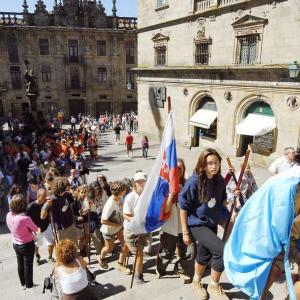Or as he is locally known – Santiago
25 July is St. James’ Day, which means that this is also the official holiday of the Spanish region of Galicia and its capital, Compostela. This is the day when the year-round pride of being a galego/a finds its ultimate culmination.
Galicians decided to make this day their nation’s official holiday in 1919 when several regional cultural organizations got together and agreed to hold celebrations starting the following year. The celebrations of this expression of regional patriotism, however, were banned during the regime of Francisco Franco (1939-1977), himself a Galician.
That being said, up until today, the feast has both a political side (for those who want independence for Galicia) and a more religious side (for those who want to venerate the legacy of St. James the Apostle).
And for those who want to party, the celebrations begin on the night of 24 July and continue onto the next day. The night festivities include fireworks at the Praza do Obradoiro in Compostela.
Also, the patron-saint day of Compostela
In the capital of the region, Santiago de Compostela, the celebration actually extends over the last two weeks of July as part of the so-called Festas do Apóstolo (The Apostle Festival).
These combine religious and traditional elements with contemporary music, theatre, entertainment, and a wide range of cultural events, filling the city’s old town and its main squares.
When July 25th takes place on a Sunday it’s called an anniversary year, an Año Xacobeo. This happens in a cycle of 5, 6 and 11 years. And in those years the party in Santiago de Compostela gets even bigger. During a Xacobeo Sunday, the Puerta Santa (holy door) of the Cathedral of Santiago de Compostela opens for pilgrims. At the end of the year the door closes again and will not reopen until a new Xacobeo.
>>> Read full article>>>
Copyright for syndicated content belongs to the linked Source : TheMayor.eu – https://www.themayor.eu/en/a/view/the-day-of-st-james-is-also-the-national-day-of-galicia-12661










